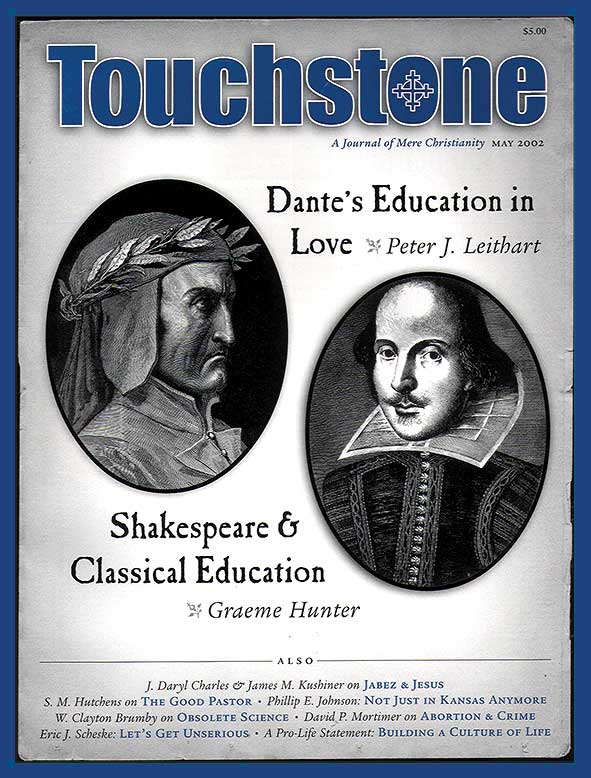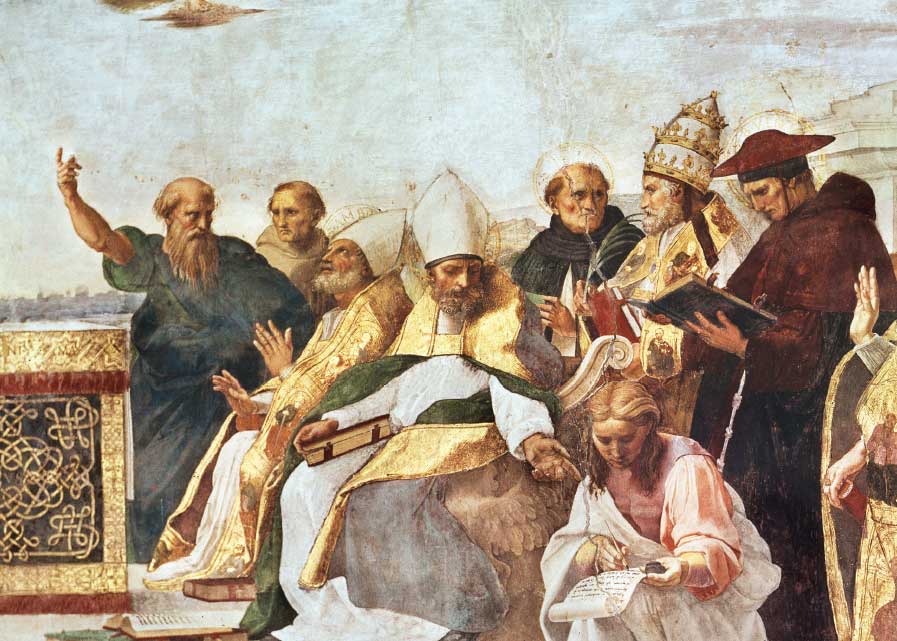Feature
Taming the Tempest
The Meaning of Classical Education
by Graeme Hunter
The idea of education is only one motif in Shakespeare’s Tempest and yet almost every line of the play is fragrant with it. Most of what I have learned in a lifelong love affair with education I find reflected there.
Like a proper education, the Tempest’s redemptive tale matures over many years. Though the dramatic action takes place in a single afternoon, the audience is made aware of 12 crucial years of dramatic time, background history without which that afternoon’s events would be unintelligible. At the close of the afternoon, all that history is redeemed, and the play, like a graduation exercise, points forward in anticipation of a better future. We must acquaint ourselves briefly with the Tempest’s strange chronicle before we can understand its educational significance.
The central character of the Tempest is Prospero, Duke of Milan, who, 12 years prior to the play’s events, had deputized his brother Antonio to govern Milan in his stead. Prospero’s reason for entrusting the government to his brother was a selfish, though not otherwise ignoble, one. He wanted to devote himself entirely to the occult arts, to white magic, with which, like many of his Renaissance contemporaries, he was fascinated. His brother Antonio, on the other hand, was a Renaissance man of quite another stamp, in the image of the infamous philosopher Machiavelli, whose book, The Prince, was the guidebook for despotic rulers.
Antonio was interested only in power and was intoxicated with the possession of it. He therefore conceived a plan for betraying and supplanting his brother, and, at a burdensome cost to the free duchy of Milan, he enlists the military help of King Alonzo of Naples in carrying it out. Forever after, Milan agrees to pay tribute to Naples. At that steep price, Antonio secures Alonzo’s cooperation, and Prospero, the rightful duke, is overthrown.
The conspirators are aware, however, that they dare not kill Prospero and his infant daughter, Miranda, for fear of causing a popular uprising. Therefore, they charge a trusted Neapolitan counselor, Gonzalo, with the task of disposing of the former duke and his daughter. Gonzalo, as it turns out, is both merciful and wise. Hence, although he carries out his charge of banishing the former duke of Milan, he does so with more humanity than they had intended. Regretfully, he puts the exiles into the unstable boat that has been provided for them, but he does not leave them in the full destitution that had been planned. Instead, he gives them sufficient clothing and food to make survival possible, and, most important of all, he provides Prospero with the magic books for which he had sacrificed his dukedom.
Helped by providence, their boat drifts on to an enchanted Mediterranean island. Prospero there encounters and subdues by magic certain good spirits, of whom the chief is Ariel, and an evil monster called Caliban. At first, Prospero befriends the monster and tries to educate him, but after Caliban attempts to rape the sorcerer’s daughter, Miranda, he is treated as a slave. Prospero dwells on the island as its master for 12 years and devotes his time to magic and to the education of Miranda, who, at 15 years of age, is a paragon of innocent beauty.
Meanwhile, in the great world of Europe, Claribel, the daughter of Alonzo, becomes engaged to the king of Tunis, and a royal party sails from Naples and its now vassal state, Milan, to attend her wedding to the African prince. On the return voyage, the ship carrying Alonzo, Antonio, and their entourage passes close to Prospero’s island, and the sorcerer, discovering this fact by his magic art, causes a storm to sweep the ship off course and wreck it on the island’s reef. With this tempest, the action of the play begins.
The occupants of the ship reach shore in different places, each individual or group assuming the others drowned. In the course of his adventures on the island, each man is given an opportunity to reveal his true nature. Evil men are shown to be prisoners of their character, moving inexorably toward greater degradation. Good men are able to grow in goodness through self-denial and discipline. In particular, King Alonzo’s son, Ferdinand, is purified by the discipline that Prospero imposes on him and so becomes fit for betrothal to Miranda at the play’s end.
But in addition to such natural developments of character, Prospero, by his magic art, is able to intervene secretly and effectively in the cause of good, with the result that no evil event on the island is exactly what it seems. Actions that are evil in intent are turned to good effect, and in the end, reconciliation and forgiveness are exchanged among all (except, perhaps, Caliban). When harmony has been restored, Prospero gives up his occult powers so as to sail back with the others to Milan, resuming the political responsibilities he ought never to have let go.
Graeme Hunter is a contributing editor to Touchstone and Research Professor of Philosophy at Dominican University College in Ottawa. He is the author of Radical Protestantism in Spinoza's Thought (Ashgate).
subscription options
Order
Print/Online Subscription

Get six issues (one year) of Touchstone PLUS full online access including pdf downloads for only $39.95. That's only $3.34 per month!
Order
Online Only
Subscription

Get a one-year full-access subscription to the Touchstone online archives for only $19.95. That's only $1.66 per month!
bulk subscriptions
Order Touchstone subscriptions in bulk and save $10 per sub! Each subscription includes 6 issues of Touchstone plus full online access to touchstonemag.com—including archives, videos, and pdf downloads of recent issues for only $29.95 each! Great for churches or study groups.
Transactions will be processed on a secure server.
more on education from the online archives
more from the online archives
calling all readers
Please Donate
"There are magazines worth reading but few worth saving . . . Touchstone is just such a magazine."
—Alice von Hildebrand
"Here we do not concede one square millimeter of territory to falsehood, folly, contemporary sentimentality, or fashion. We speak the truth, and let God be our judge. . . . Touchstone is the one committedly Christian conservative journal."
—Anthony Esolen, Touchstone senior editor














